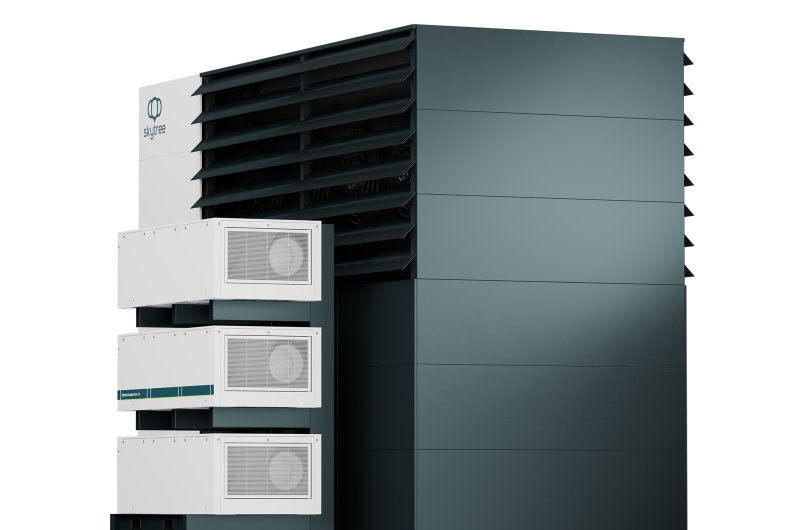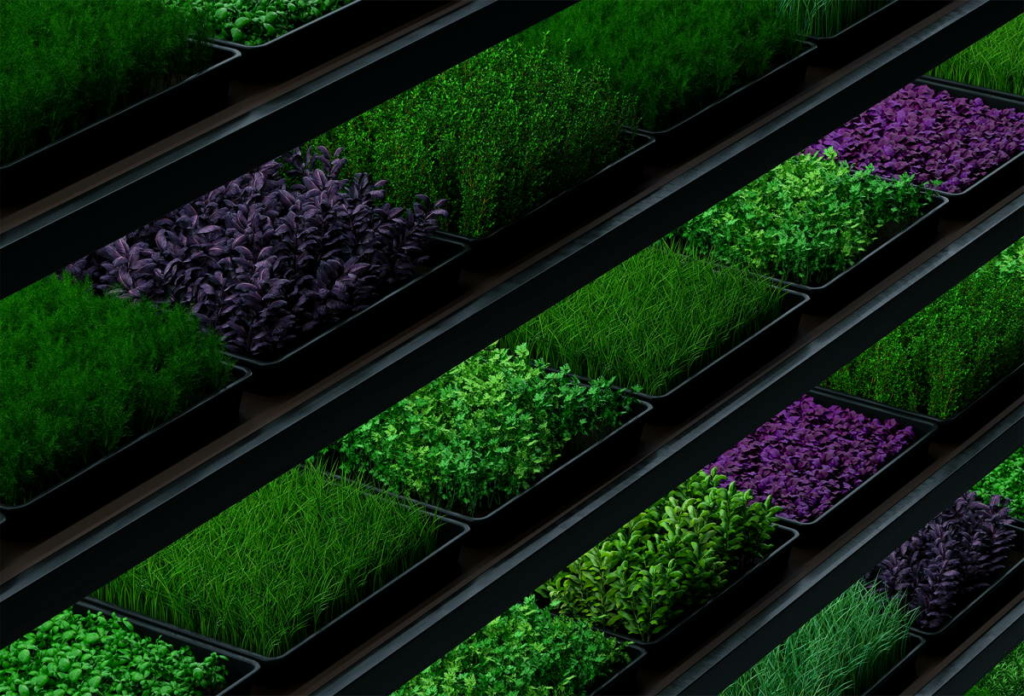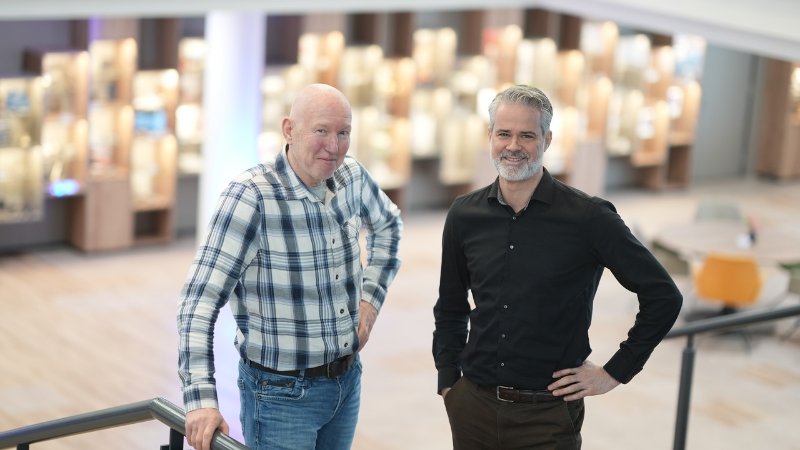Skytree is driving the circular economy by transforming CO2 from a waste product into a valuable resource, extracting it from the atmosphere at the location where it’s needed. In addition, the company’s modular technology is also ideal for large-scale carbon storage projects, generating negative emissions. Together with Alten, Skytree has implemented IoT solutions to solve challenges in the remote management and maintenance of its CO2 capture devices.
In today’s world, CO2 is often viewed solely as a harmful byproduct of fossil fuel usage in cars, factories and planes, contributing to climate change and environmental degradation. What many don’t realize is that it’s also a critical and valuable resource across various industries. From vertical farms to greenhouse growers and drinks producers – they all depend on CO2 to make the products we consume daily. In greenhouses, the gas is used to boost crop yield; in beverage production, it’s essential for carbonating drinks. Likewise, it’s a highly valuable commodity in vital medical and industrial processes.
In recent years, many businesses have been struggling with surging demand for CO2 and dwindling or unreliable supply, creating a paradox where an abundant gas in the atmosphere isn’t always readily available in a usable form. Some beverage bottling facilities and breweries were forced to close due to poor availability. Often, where CO2 is available, it comes at a price premium, which cuts into profits.
Recycling is a familiar concept for consumers around the world – but few would think it applies to natural gas or carbon dioxide. As global resources like CO2 become scarcer, it’s increasingly important to find new ways to maintain a secure supply while acting responsibly to protect the planet and economic progress.
Skytree was born from groundbreaking work at the European Space Agency (ESA). In ten years of applied research, the company has developed a direct air capture (DAC) system that efficiently absorbs, desorbs and releases CO2 when needed. It can be installed right next to where the gas is consumed. This offers a sustainable solution for repurposing atmospheric CO2, overcoming significant technological challenges. Currently, Skytree has two products, Cumulus and Stratus. Cumulus can capture 20 kg of CO2 a day, whereas Stratus can capture over 700 kg a day.
Recognizing the need for an advanced IoT solution to manage and maintain its DAC systems effectively, Skytree enlisted Alten’s expertise in building complex IoT architectures. Alten’s team stepped in to design and implement the system within three months, delivering the required critical infrastructure. Through their collaborative efforts, the partners successfully launched a robust IoT system that now forms the backbone of Skytree’s Uptime Assurance offering, a comprehensive service and maintenance package to ensure uninterrupted CO2 supply.

IoT solution
A key challenge is the remote management and maintenance of the CO2 capture devices. Integrating an IoT solution into Skytree’s DAC systems is crucial for seamless operation and maintenance. The devices are equipped with sensors that continuously monitor various operational parameters such as airflow, temperature and humidity. By transmitting this data to a central platform, engineers can remotely assess the health of each system and detect any deviations from optimal performance in real-time.
Remote control capabilities empower operators to adjust system settings on the fly. Using Azure Device Twins, configuration settings can be monitored and updated in real-time, ensuring that the DAC system adapts to changing conditions. Additionally, by utilizing Azure IoT Hub Direct Methods, operators can start or stop the machine remotely with immediate effect.
All the data generated by the DAC system is securely stored in the Azure cloud using Azure Data Explorer. This powerful time-series database enables Skytree engineers to analyze system performance, monitor CO2 production levels and detect anomalies. The data is also visualized to provide clients with clear insights into the performance and how much carbon dioxide is being captured.
Overall, the project required precise coordination between Skytree and Alten due to tight timeframes. To meet deadlines, the teams prioritized defining the interface – specifically the data and command payloads – at the very start. This allowed Skytree to focus on integrating the interface into their machines while Alten concentrated on developing the cloud solution. By aligning on the interface first, the partners were able to work in parallel, ensuring a smooth and efficient implementation that met the critical deadline.
This IoT solution is key to Skytree’s Uptime Assurance program. The company guarantees high uptime, monitors and measures CO2 generation and conducts all preventive and corrective maintenance to ensure uninterrupted operations.
Leap forward
The next step is integrating IoT Edge on an industrial PC directly with the machine. This local computing device will enable on-site monitoring and control, even if there’s limited connectivity to the cloud. It will also facilitate integration with partners like Deep Sky (see inset), allowing for a seamless exchange of data with other systems such as climate control or advanced analytics platforms.
For local data storage, InfluxDB will be utilized on the edge PC, enabling efficient collection and analysis of high-frequency data. A local website hosted on the edge PC will provide a user-friendly interface for interacting with the machine, offering control and monitoring capabilities directly on-site. Additionally, a Grafana instance will run on the edge PC, providing granular insights into the machine’s performance through detailed dashboards and visualizations. This setup will allow engineers to analyze key metrics such as CO2 capture efficiency, energy consumption and system health in real-time, even at the edge.
The integration of Skytree’s innovative DAC technology with an advanced IoT solution represents a significant leap forward in sustainable CO2 capture and utilization. The remote monitoring and management provided by Azure IoT Hub, Device Twins, and Direct Methods ensures continuous, real-time operation and maintenance of the system, allowing for precise control of performance parameters. The use of Azure Data Explorer for secure, cloud-based data storage enables Skytree’s engineers to conduct in-depth analyses, while the future integration of IoT Edge and local computing promises greater resilience and on-site control.
This technical evolution not only supports Skytree’s Uptime Assurance program but also opens new possibilities for scaling the technology together with Deep Sky. By combining cutting-edge IoT infrastructure with on-site monitoring tools like InfluxDB and Grafana, Skytree is positioned to optimize the carbon removal process, paving the way for broader adoption and impactful contributions to global sustainability efforts.



